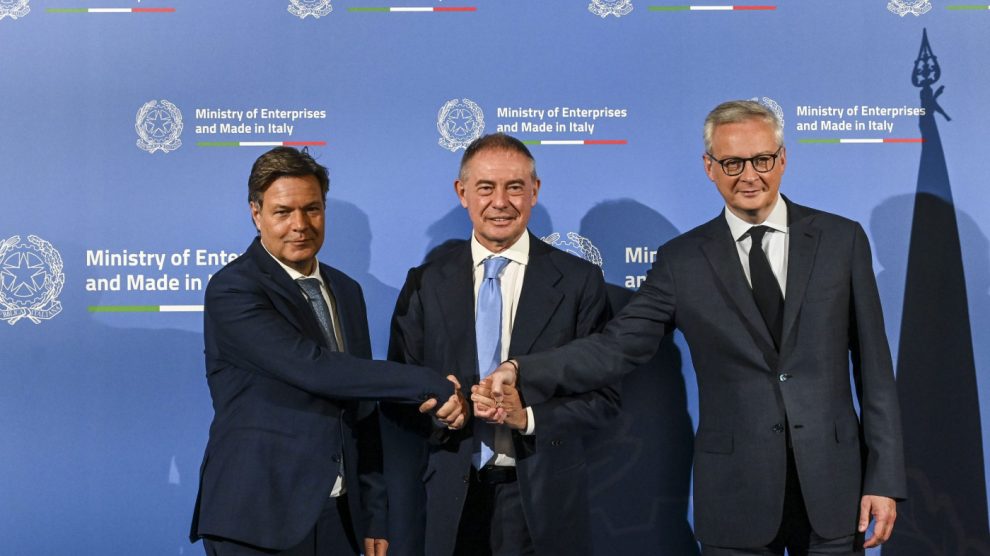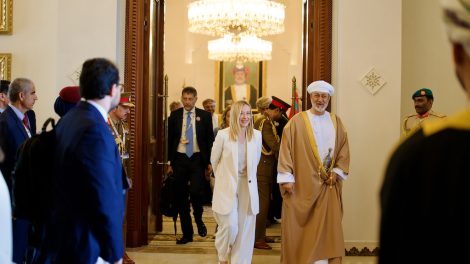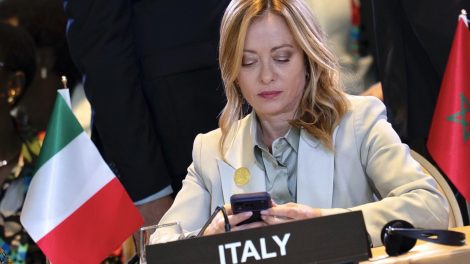Bolstering the Rome-Paris-Berlin triangle. The EU’s three biggest economies are moving in lockstep on artificial intelligence, as emerged from the Monday meeting between Italy’s Enterprise Minister Adolfo Urso and his French and German counterparts Bruno Le Maire and Robert Habeck. When they convened for the first time under this new trilateral formula last June, the trio had committed to deepening cooperation on critical raw materials. This time around, it’s artificial intelligence and its role in the twin transition.
Big days for AI. The frontier technology was front and centre on Monday: G-7 countries published their International Code of Conduct for Advanced AI systems, and US President Joe Biden signed an executive order to strengthen government control over the sector. All this on the road to the world’s first AI Security Summit, to be held at Bletchley Park, UK, on November 1-2.
- As the world moves quickly to regulate AI, France, Germany and Italy seek to lead the EU front. The trilateral was “a meaningful message” to Brussels and European partners, said Minister Urso in a communiqué, as it showed “ the path that we need to walk together to navigate at best the current technological and scientific shift.”
- He then promised to continue the discussion at the G-7 level during the Italian presidency in 2024. Prime Minister Giorgia Meloni had indicated that AI governance will be among the key priorities.
Progress through industry. “We have entered a new technological revolution, and we need to tackle it with new ideas, new approaches and new tools,” remarked the Italian minister, noting that AI policymaking is a forefront issue for the entire bloc and stressing the need to “work together on it at EU level, hand-in-hand with industry.” After their trilateral meeting, the ministers met with representatives of Italian, French and German industry.
- Acknowledging AI’s “enormous transformative power” (which will significantly impact the EU’s industrial strength, productivity and competitiveness), the trio stressed the need to place this “strategic” tech at the heart of European industrial policy, as the bloc’s competitive advantage depends on how well it will exploit an implement the latest advancements.
But how? Through their cooperation, France, Germany, and Italy aim to enable European companies to compete in this leading sector by reducing taxes, simplifying procedures for multinational projects, supporting start-ups and SMEs and creating a “strong European venture capital ecosystem to enable innovative firms to receive the much-needed financing to further step-up their growth.”
- One route entails developing a pan-European knowledge and innovation network by connecting the various national centres of excellence, likely through a new AI-dedicated EU consortium.
- Meanwhile, the bloc should design its AI laws not to be overbearing, remarked the three ministers. They welcomed recent advancements towards creating the EU’s AI Act but warned that it should be designed “without unnecessary bureaucracy”.
- They also called to “drastically reform, simplify and fast-track administrative procedures to authorise investment projects in the EU and to create a simple and predictable regulatory environment, particularly for SMEs.”
The critical raw materials playbook. During their meeting, Ministers Urso, Habeck and Le Maire also took stock of the progress made by the trilateral working group on critical commodities launched during their last meeting. The trio took note “with satisfaction” of the “fruitful and agile coordination” between their countries in the framework of EU and international negotiations, especially the Minerals Security Partnership.
- They also floated the possibility of cooperating on investments, stress tests, stocks and joint procurement when the EU’s Critical Raw Materials Act comes into force. This issue cannot be separated from “financial instruments to be mobilised for projects of common interest,” reads the communiqué.





